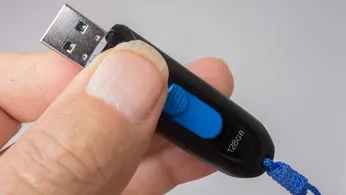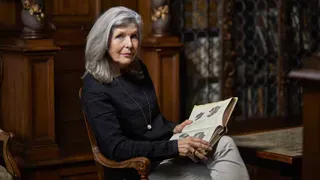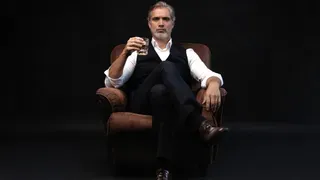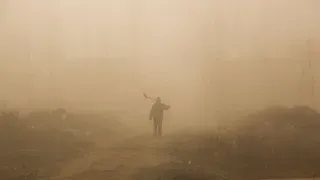
March 4, 2024
Peripheral Visions: You Wanted This
Kilian Melloy READ TIME: 20 MIN.
Peripheral Visions: They coalesce in the soft blur of darkest shadows and take shape in the corner of your eye. But you won't see them coming... until it's too late.
You Wanted This
"You wanted this?"
He looked up at the young woman who had entered the access room. She held out a dull silver oblong.
It was, he realized, the drive. He took it, looked at it with fascination. He'd never seen one in person before... actually, he corrected himself, he had. He must have. But this was still a novel experience.
He rolled the metal oblong between his fingers. It looked, he thought, like a torpedo. Was that an apt likeness? He wondered if the memories it contained would serve the same explosive purpose.
Maybe that's what I need, he mused. Maybe I need to blow up my life.
"Are you sure?" she asked.
He smiled at her uncertainly and gripped the drive harder.
"I'm required to ask," the young woman told him. "Just because, in case... I mean... "
"For liability," he said.
She dropped her eyes. "Yes."
"Don't worry, I'm not going to commit suicide in your nice access lounge," he told her, gesturing around him. It was a nice room; genuine wood paneling, a comfortable day bed where he could sit of lie down while he accessed the contents of the drive. It made sense: The bank was one of the most well-respected in the city, and it only served citizens. Wealthy citizens. Workers had to make do with banks that offered no such niceties. Worker banks had safe deposit boxes, of course, but if they offered access lounges then those spaces would certainly be smaller, dimmer, shabbier.
Nice as the bank and its amenities were, he had only reserved the room for an hour. He smiled at the young woman and raised his eyebrows, as if to ask whether he might be left alone.
She understood at once. Smiling at him shyly, almost apologetically, she left the lounge.
His jittery fingers were still fidgeting with the drive, rolling and squeezing it. He almost feared he would crush it, crumpling the casing and maybe even splitting it open, spattering its metallic crystalline gel. But, no; he knew that wouldn't happen. If anything were to be crushed, it would be him. People stored memories away for many reasons – good reasons having to do with bad things: Trauma, or guilt, or loss...
He briefly reconsidered using the drive, then hardened his resolve. He couldn't turn away; it was now or never. Today was his sixtieth birthday. He had been determined to go to the bank, keep his reservation at the depository, and spend his allotted hour finding out what his younger self had been so eager to forget.
Not forget forever, though, and that was the thing. If he never wanted to remember whatever it was he'd stored on the memory drive, he would simply have erased the memories. Memory mapping had made the obliteration of memories possible; all you had to do was remove them from the brain and then delete them instead of transferring them to a gel drive. Young people of means routinely erased painful memories of love affairs that hadn't worked out, or friendships that had ended, or experiences they had found unpleasant. Taking the extra step of preserving the memories on a gel drive meant additional costs. When he'd been young, he knew, he'd paid three thousand docelars to put those memories on the drive, in addition to the seven thousand the extraction process had cost. Keeping the drive in an extra-secure deposit facility, as mandated by law for preserved memories, had cost him five hundred per year for...
Thirty-seven years now, he thought, with a pang of regret for so much time gone by. He had just turned twenty-three when he'd had the memories removed, clearly with the intention of one day reclaiming them. Well, he thought, the day had come: Whatever he had wanted to forget back then, he was going to remember it now. And if the memories were something he wanted to forget again, that was easy enough.
"I could remember then forget, then forget that I remembered," he thought.
Was that how the popular song went? It was a clever lyric; he suspected it was cleverer than he was remembering. Maybe I need a memory drive to enhance my day-to-day recollections, he thought – another use for memoryware technology.
Maybe forgetting isn't a bad thing.
But the drive in his hand was a statement from his past: There was something he was supposed to remember. Why didn't I leave myself instructions? A timetable? Why trust blindly that I'd access these memories at the proper time... that there would even be a proper time?
His lawyerly mind came up with a long list of reasons and motivations, none of them attractive. They all came back to his younger self not wanting to create any sort of paper trail. He couldn't imagine he'd ever done anything so terrible that there would be consequences (emotional, mental, legal) for recalling these memories at this point in his life. It must have been something that his youthful self couldn't handle...
But could his older self handle it any better? If not, would it really did blow up his life? What then?
He fidgeted with the drive, looking it over, an anxious smile on his face.
If so, then so, he told himself. If the memories stored on the drive made a ruin of everything he'd built, exposed his life as a lie, brought some hideous secret out of the past... well, then, maybe that was why he'd saved them in the first place.
***
The torpedo-shaped drive was decades out of date. Newer drives were flat and wafer-like. They could also hold more information... much more. A whole lifetime could be stored on a single hi-cap drive these days.
He'd anticipated this and come prepared. His cerebral enhancements were modern, but he could interface with the drive using an adaptor. He had no fear that the memories would no longer be readable and coherent after so long; the metallic crystalline medium was unlike ordinary matter, its special properties offering a lossless energy state that defied entropy and data degradation. Trillions of years from now this drive could, in principle, retain his memories with perfect fidelity. Of course, any living beings that still existed by then might not have compatible nervous systems to relive his experiences, but then again, they probably wouldn't care to.
There was something comforting in the thought that his memories could exist forever, and it was equally nice to know that in all likelihood no one would ever even want to access them. It was immortality of a sort, he supposed; the potential for his experiences to be re-lived, together with the promise of privacy.
Enough of this, he told himself.
He sat on the daybed, then stretched out. He examined the drive all over again, rolled it between his fingers.
Why was he delaying?
He was afraid, of course.
He remembered amusing himself in childhood by creating "time capsules," envelopes or boxes containing small items he would store away to surprise and delight himself in the future. More than once he'd opened such a time capsule to find a long-lost treasure. As a teenager he'd opened an envelope sealed half a decade before and found a love note from someone he only half remembered.
This was going to be better. No faded memories waited for him; rather, the pure, raw experience of recollection was in store. From what he'd read and heard, retrieving a stored memory was an intense, sometimes overpowering experience: The memories came on like a full-sense virtual or a hallucination, with brilliant colors and vivid images, all the sounds and sensations of a previous moment flooding in with the immediacy of the time in which the memories had been made. He didn't know why, but it was said that retrieved memories had greater fidelity to actual experience. Something about memories left to play in the brain over and over again being subject to a gradual process of rewriting.
Maybe this would be a cherished moment of fun from a time in his life when he could imagine being older and in need of a reminder of what it was to be young.
He doubted that. Knowing what his priorities had been at age twenty-three, he'd more likely than not extracted a painful memory – a youthful folly or a guilty secret.
A new spasm of fear went through him.
If he and Maria had...
His heart started to race. He'd avoided thinking about it, but a major detail about accessing old memories was that it was a crime to destroy memories relating to illegal activity – and that included activity that had once been legal, but no longer was. In today's America, criminal liability was retroactive.
He had made a good career out of being a lawyer. He'd made connections, sowed favors. He'd learned the labyrinth of the law and, thanks to that, navigated the hazards of everyday life successfully. If the memory he was about to access was criminal in nature, he would know how to defend himself on procedural grounds. There were plenty of technicalities and loopholes to exploit, if one had... or was... a good attorney.
Of course, he could simply never own up to a memory of illegal deeds... though the biotrackers built into his commchip could create a web of circumstantial evidence that might catch him up, a wed that some eager young prosecutor might set about untangling. In that case, he might use his friendships with people in law enforcement and in the judiciary to his advantage, but that could still result in a smudge on his record or his reputation.
But even he had a major skeleton in the closet – something that wouldn't be so easy to sidestep despite his lawyerly talents – he still had to know. The memory was gone from his mind, but the hole it had left remained, and the shape of that hole had troubled him for more than half his life. Rare were the times he found himself consciously obsessing over the memory drive and what it could contain; usually it was a dream that stirred his anxieties – not a dream of a memory, but a dream of the life context where a memory had been. There was a flavor there of youthful excitement and regret, a sensation of anxious suspense, a certainty of being in trouble.
It wasn't hard to make a guess. He no longer remembered why he and Maria broke up the summer after his sophomore year in college; he suspected the answer to that had was on the memory drive. He was terrified that the reason was an abortion. Even without his legal expertise, he probably wouldn't face prosecution for something like that; men seldom did. He probably wouldn't even need to call in any favors to void negative impact from something like that.
But his memories could implicate Maria, and she, unlike himself, would be liable for prosecution. He still carried a vague... but powerful... sense of having wronged her somehow. He didn't want to wrong her again. She was a grandmother now, living in Ohio somewhere... or so he'd heard. Who knew if that was still true? He could find out, of course, but he chose not to. He told himself it was to respect her wishes, but he wasn't sure if that was simply an excuse not to have some new image of her enter his mind, replacing a fantasy of her still somehow being the young women she had been with whoever she had become in reality.
He stared at the drive, trying to intuit its secrets. Had she walked away from him? Or had he broken things off? Or was it mutual?
He suspected that he was at fault. He'd always had a sense of regret about losing her, however it had happened.
Maybe it wasn't an abortion. Maybe the memory wasn't even about their breakup. Maybe it was something bigger than that...
Had they given a child up for adoption?
He lay back on the day bed and sighed. New doubts assailed him. What good could retrieving those memories do him now? What good could they do Maria? Or anyone? As a younger man, he might have thought such a memory would provide wisdom later in life without reckoning with the potential for regret. How could he have, not having experienced the life that still lay before him at that time?
He'd married Jenny, and their marriage had been as childless as it was loveless. For three decades he'd held off on any temptation to access the memories on the drive lest they upend and unbalance the perpetual stalemate he and Jenny had settled into. When divorce had become illegal, the two of them had agreed to coexist with as little friction as they could manage; each of them knew too well how miserable they could make each other. Forbearance had become a kind of self-preservation.
Now Jenny was dead, and he was too old for the mandatory marriage laws to apply to him. A cold war of a marriage was no longer an excuse for not peering into his own past to see what kind of skeleton he might have buried... seeing, for that matter, what made those bones rattle at night in the basement regions of his subconscious.
Still, though, still... was he about to make a mistake?
Let's find out.
The oblong fit neatly into an adaptor, and the adaptor fit neatly into the port behind his ear. The transduction tech had improved so much over the last four decades that he wouldn't have any hangover from accessing the memories... that was the claim, anyway, and he hoped it was true. When the memory had been extracted it had been a matter of powerful EM waves passing through brain and bone and skin, and it had involved a complex array of electrodes. Or had they been called neurodes? In any case, they had been situated directly over the memory areas of the brain.
The tech was different now, more refined and less intrusive, but he would still have to rely on transduction. His temporal port was nowhere near his prefrontal cortex, where memory was mainly stored and where the "objective" and "factual" aspects of the retrieved memory would be deposited. His amygdala, where the "emotional" and "meaning" parts of the memories would be deposited was below the temporal port but buried deep under layers of grey and white matter. It would take time for the memory transference to happen, and if he didn't get started right away his allotted time wouldn't be enough for a complete transfer.
Zero hour he thought. Devices properly aligned, everything ready to go, he summoned a final swell of determination. He reached up, probed behind his ear with a fingertip, found the switch, and activated the devices...
***
A haze of light, a swirl of sound, a chaos of emotions.
Nothing made sense.
Then everything came into focus... and everything played out just as it had before, just as it must...
***
Sitting in the coffee shop on a Saturday night. Looking with boredom at the dance party taking place on the floor. Feeling crowded by the tables that had been pushed to the margins of the room, feeling uncomfortable at how the chairs were too close together, and really feeling uncomfortable with how close the blond guy was to him. The blond guy had bright blue eyes. The guy looked over and smiled. Really uncomfortable with his smile... with how it excited him... "Hi. My name is Franz..." The blond guy, still smiling, expected a reply. Should he answer? Should he be friendly? Should he walk away? He didn't want to walk away. He didn't want to feel these feelings. He should be feeling these feelings for a girl, for that girl Maria who was always sitting next to him in the dining hall and making a point of chatting him up. She was nice. But her smile didn't stir him like this. Her brown eyes were pretty. But her brown eyes didn't pluck at him, thrill him, fasten onto and fascinate him the way these blue eyes did. He should warn the guy off, say something threatening, make it known that he wasn't going to stand for this... But he didn't want to. He wanted to stay here, near this guy, this guy sitting too close, this guy leaning over to talk to him over the loud music. "I'm Franz," the guy said, still smiling. He was still trying to decide how to respond when he heard himself answer: "I'm Caleb."
Walking across campus to another dorm building the following afternoon. Cloudy spring day. Humid. A smell of damp and green in the air, a smell of lingering winter, a smell of impending warmth and blossoms. His body feeling light and alive. His body feeling buoyed and electrified. He walked into the dorm and up the stairs to the room where Franz had told him he lived. "I'm an RA, they're putting me in charge of an upperclassman dorm next year, they're letting me get some people together to share the dorm, do you want to talk about it?" Franz had seemed so nice the night before. Was there something to it? Something more than just niceness? He'd felt something he never felt with Maria. He'd felt something he never felt with any girl. He'd felt something like this in high school with Andrew, at least until Andrew came out. He still felt it after Andrew came out, but he distanced himself, told Andrew to get lost, and, when Andrew stopped coming to school, he found that he missed Andrew and he hated himself for missing Andrew. He never wanted to feel the way he felt for Andrew, not for another guy. But now Franz... Franz keyed into those same feelings somehow... He wanted to sit with Franz in his room, talk without the blare of music, talk in quiet and private, measure and assess, figure out what was going on and what to do. He knocked on the door. No one answered. He knocked again. Franz wasn't home. He tried the knob and the door opened. He walked into Franz's room, feeling like it he was trespassing. But he knew Franz wouldn't mind. Franz had a double room to himself. In the other room was a second bed without linens; a bare desk and empty bookshelf; nothing else filled the second room but wan light, already fading. He sat in the occupied room, the room with a neatly made bed, a desk with books and notebooks, a shelf with more books, two OTA speakers sitting on the floor that must pair with the laptop sitting closed on the desk. A guitar case leaning in a corner. A smell of pipe smoke. Pipe smoke? Franz smoked a pipe? The smell was comforting, reminded him of his grandpa, of his favorite uncle. He watched from the window, looking at the world as Franz saw it, thought about how Franz must be, what is life was like. Then he heard Franz at the door, and he smiled as Franz came in and saw him. "I decided to wait and see if you would show up. I like the way it smells in here. I hope it's okay." And Franz smiling, that same entrancing smile, "I'm glad you're here, I wondered if I would see you again." And Franz drawing near and himself getting up out of the chair and somehow the two of them knew – somehow their bodies were suddenly tangled, their mouths were tasting each other, and Franz was asking permission. He didn't quite know what Franz had in mind but he was certain that, yes, he wanted to do it... and they did...
Discovery. Nights of vague light through Franz's windows and gasping breaths and heat. Mornings of gentle tickles, laughter, murmurs. Furtive showers taken together. Discovering how Franz's body reacted, how his own responded. Lips kissing lips, lips kissing... other places. Clumsy, fun, amateur massage using thick, cold oil from a plastic bottle. Almond oil. It had a smell, a smell like sandalwood... "I added some essential oil," Franz said. "Aromatherapy." The smell of Franz was therapy in itself. His delicious musk, it made him dizzy to smell Franz, to discover how soft his scent was as they woke up together and how sharp it was, how it pierced him and made him lose his mind in the torrential nights...
The end of the school year. A sudden shyness, a sudden uncertainty they had never before experienced with each other. Was this going to come to an end? Was there a way forward?
A summer apart, marked by emails, late night video calls, even some scribbled postcards because Franz went to Europe with his family. He treasured those post cards but kept them a secret. He worked the summer with his favorite uncle, a lawyer; worked in his office as a sort of unofficial paralegal. "You want to practice law?" His uncle could get him into the best law school if he wanted, but he had to maintain the grades, it was all about the grades... and the extracurriculars, too: Join debate club, get some community involvement under his belt, volunteer for a Theopublican candidate... and for God's sake make sure his girlfriend was pretty. Did he have a girlfriend? More than one? His favorite uncle winked. Decide which girlfriend you want to bring with you to meet the right people, to work with the right organizations. She'd better be the pretty one. He smiled knowingly at his uncle but didn't really know what he was saying. And summer's end, and back to school, and... Franz!
Fighting over the debate club, fighting over the political campaign he was volunteering for. "Why him? He's a fascist!" "I know, but he's going to win." "Is that all that matters?" "What else? What else should matter?" What mattered after all the arguing was them. Franz. How he smelled, how he tasted, his moans and guttural gasps in the darkness, his ardor in giving pleasure just as he so arduously received it... "If it's us that matters to you then why do you need to see Maria?" "I need a girlfriend. It's a career thing, not for my happiness but for my future." "And fucking her? That's a career thing too?" "I won't fuck her." "Not until your uncle tells you to." "He won't tell, he'll just assume." "And Maria? Will she assume? What about when she starts nagging you to give it up to her already?" "I... I don't..." "You have a career place for that too?" "I... I'll tell her." "You'll tell her? Are you nuts?"
And Maria, a delicate dance of devotion and delay. And another fight with Franz. And being with Maria partly out of spite and partly for the comfort of being with someone, and then those nighttime shadows, and curiosity, and finding that his youthful flesh responded even when it wasn't Franz, even when it wasn't a male body... there was no delirium, but there was a sense of responsibility being fulfilled...
Not telling Frantz. More fights, more making up with Franz. More Maria.
Somehow things just kept swinging like a mad pendulum, swinging and never flying apart. Then came spring, and graduation, and Franz's parents. Their last night together. He had to slip out early in the morning, circle around, pretend to meet Franz by chance. Franz introduced his father, who hardly seemed to notice him, and his mother, whose expression shifted; her eyes dug into him; she knew. Maybe she smelled her son on him? Maybe she saw something in his bearing, in his aura, heard something in his voice as he exchanged hellos with Franz and then offered congratulations and best wishes... how did she know? But, oh, she knew...
A stolen moment that evening, after graduation, before Franz went off to dinner with his parents. "I'm sorry," Franz was saying, "I was giving you such a hard time about Maria, about not being out, and I can't even tell my parents. I'm going to end up doing the exact same thing you've been doing. I told myself I wouldn't. I refused to play that game, and... and here we are. I've got medical school ahead of me, and my dad has made it plain that I can't get through the next four, eight years without a 'helpmeet' – that's how he put it. It makes no sense. I won't have time to be with anyone I want to be with, I have to play this pantomime for him? And, but... he pays my tuition, he's putting the pressure on me, he's calling the shots."
He looked at Franz and was about to say...
And Franz's sister appeared just then. "Mom and Dad said I should tell you..." She looked from at the both of them. It was written all over their faces, their yearning bodies, their trembling hands that had been caressing, stroking, gripping. She looked from one to the other and her eyes grew sad. "I'll meet you later," and she looked at him, not at her brother but him, and her eyes said so many things, all of them kind and sympathetic.
And another summer that he hardly noticed, the pain of loss and separation was so great...
And Maria, who was kind and didn't understand but who sympathized all the same...
And him telling her one night, and her saying she would help him. "Help" him. And she started to use all the tricks and techniques that had become familiar, but it wasn't sex he wanted, and it wasn't sex that was going to help. He wanted Franz. He told her so. He would never love a woman, not the way he would love a man. He would never love Maria, not the way he loved Franz. He told her so. She said "I understand," and "I'm sorry," and "We need to let go of each other, but you also need to let go of Franz." And she said, "The world isn't fair. Please try to be happy." And he missed her, too, he realized, in her own way.
A summer that seemed lonely and blank, and he tried to hook up once or twice, but it wasn't in him.
And then in the autumn... Franz's sister, a quick flyby of the college campus, she found him. She handed him something, a small charm, a token... "It's Franz," she said, not "from Franz," but "It's Franz."
A metal oblong.
And she told him what it was and what he needed to do with it...
***
He gasped and twisted and shook. The flood of memories tapered, stuttered, ended.
Was he Caleb? Was he Franz? No... he was Caleb. He was Caleb, and they had been his own memories.
***
He went about the next few weeks in a state of bliss and agitation; it was a time that seemed to exist outside time, and it weas a time into which decades of time seem to crowd. Lost time, remembered time, regretted time, cherished time.
What was the title of that book? That long French book about memory? "Time Regained?" Yes, that was it. This was what it felt like: Time regained, along with memory regained.
And yet, he had no time to waste.
***
"I was never career minded," he explained. "But when my uncle said he'd pay for the memory extension tech... I had to say yes. It was what he wanted, it was the kind of leg up he wished he'd had himself. He wanted me to be the lawyer he'd been, have the life he'd enjoyed. He was a bit of a narcissist, but he meant well. When I asked him to pay a little extra for a memory extract... well, he didn't ask too many questions. He just said he'd been young once, too, and there were things he would have deleted from his own memory when he went to law school, things that he could have focused better without having them on his mind. I didn't tell him I was saving the memories I was having extracted. He didn't ask.
"And, well, to be honest, I don't think I could have gotten through the next few years if I'd had those memories to deal with. It would have been too much. It was a lot as it was... My uncle got me into a very prestigious school, just like he said he would. And he wrote the checks to pay for it. Just like your dad wrote you checks for med school."
Franz's blue eyes stared into Caleb's, intense, puzzled.
"And we know each other from med school?" Franz asked. "You went to med school after law school?"
"No. College. I'm old, but I'm not that old. You're two years older than me, in fact."
"I don't get it. Who are you? I don't remember you."
"Of course not. Just like my uncle paid my tuition, your dad paid yours."
"Yeah, you said that."
"And just like my uncle paid for me to lose some painful, distracting memories I wasn't ready to do anything about, your dad paid for the same. Thanks to your mom, who slipped you some extra cash, that fee included preserving those memories. And, thanks to your sister, your memories ended up with me. And I put them away in a long-term safe deposit facility. I paid enough for fifty years of storage. Thankfully, I didn't need that long before I... before I remembered they were there."
"I don't understand."
Caleb held up a metal oblong. "You know what this is?"
"A piece of metal?"
"It's a first-generation memory drive. A special kind of gel drive designed to preserve memories and make it possible to retrieve them later on."
"And they're my memories?"
"That's right." Caleb offered the oblong.
Franz hesitated. "What are they?"
"They're memories of us."
"You and me?"
"You and me."
Franz still hesitated. "Why?" he asked.
Caleb took a moment to answer. He extended his hand closer to Franz, who finally accepted the memory drive and all it contained.
Franz smiled, eyes bright and hopeful. "Because," he said. "You wanted this."
Next week our sight pierces the veil of the years to show us a future time in which an elderly poet yearns for a longer lifespan... and a very special fan club is poised to grant him that desire. But, as always, you have to be careful what you wish for...
Kilian Melloy serves as EDGE Media Network's Associate Arts Editor and Staff Contributor. His professional memberships include the National Lesbian & Gay Journalists Association, the Boston Online Film Critics Association, The Gay and Lesbian Entertainment Critics Association, and the Boston Theater Critics Association's Elliot Norton Awards Committee.







